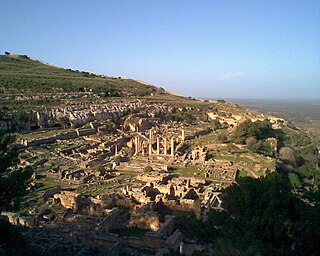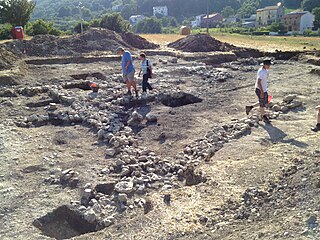Related Research Articles

Oberlin College is a private liberal arts college and conservatory of music in Oberlin, Ohio. Founded in 1833, it is the oldest coeducational liberal arts college in the United States and the second-oldest continuously operating coeducational institute of higher learning in the world. The Oberlin Conservatory of Music is the oldest continuously operating conservatory in the United States. In 1835, Oberlin became one of the first colleges in the United States to admit African Americans, and in 1837, the first to admit women. It has been known since its founding for progressive student activism.

Cyrene or Kyrene was an ancient Greek and later Roman city near present-day Shahhat, Libya. It was the most important of the five Greek cities in the region, known as the pentapolis. It gave eastern Libya the classical name Cyrenaica, which it has retained to modern times.
Gisela Marie Augusta Richter was a British-American classical archaeologist and art historian. She was a prominent figure and an authority in her field.

Harriet Ann Boyd Hawes was a pioneering American archaeologist, nurse, relief worker, and professor. She is best known as the discoverer and first director of Gournia, one of the first archaeological excavations to uncover a Minoan settlement and palace on the Aegean island of Crete. She was also the second person to have the honor of the Agnes Hoppin Memorial Fellowship bestowed upon her, and the very first female archeologist to speak at the Archaeological Institute of America.

Mary Church Terrell was an American civil rights activist, journalist, teacher and one of the first African-American women to earn a college degree. She taught in the Latin Department at the M Street School —the first African American public high school in the nation—in Washington, DC. In 1895, she was the first African-American woman in the United States to be appointed to the school board of a major city, serving in the District of Columbia until 1906. Terrell was a charter member of the National Association for the Advancement of Colored People (1909) and the Colored Women's League of Washington (1892). She helped found the National Association of Colored Women (1896) and served as its first national president, and she was a founding member of the National Association of College Women (1923).

Elizabeth Bayard French, FSA, also known as Lisa French, was a British archaeologist and academic, specialising in Mycenaean Greece, especially pottery and terracotta figurines and the site of Mycenae. She was the first woman to serve as director of the British School at Athens (BSA).
Stephen Frederick Starr is an American expert on Russian and Eurasian affairs, a musician, and a former president of Oberlin College.
Susan Ellen Alcock is an American archaeologist specializing in survey archaeology and the archaeology of memory in the provinces of the Roman Empire. Alcock grew up in Massachusetts and was educated at Yale and the University of Cambridge. She is currently Special Counsel for Institutional Outreach and Engagement and Professor of Classical Archaeology and Classics at the University of Michigan and became the Interim Provost and Vice Chancellor for Academic Affairs at the University of Michigan - Flint in July 2018.
Nora Naranjo Morse is a Native American artist and poet. She currently resides in Española, New Mexico just north of Santa Fe and is a member of the Santa Clara Pueblo, part of the Tewa people. Her work can be found in several museum collections including the Heard Museum in Phoenix, Arizona, the Minneapolis Institute of Art in Minnesota, and the National Museum of the American Indian in Washington, DC, where her hand-built sculpture piece, Always Becoming, was selected from more than 55 entries submitted by Native artists as the winner of an outdoor sculpture competition held in 2005. In 2014, she was honored with a NACF Artist Fellowship for Visual Arts and was selected to prepare temporal public art for the 5x5 Project by curator Lance Fung.
The Extramural Sanctuary of Demeter and Persephone at Cyrene, Libya is located on a coastal plateau of Libya, beyond the boundaries of the city (extramural). In approximately 630 BC Greeks from the island of Thera colonized Cyrene. Other Greek colonists not long after increased the population, thus transforming Cyrene into what was regarded as both the largest and wealthiest Greek colony of North Africa. Archaeological excavations of Cyrene's Extramural Sanctuary of Demeter and Persephone, also known as Kore, daughter of Demeter and legendary Queen of the Underworld and consort of Hades, began in 1969 under the sponsorship of the University of Michigan. Between 1973 and 1981 the University of Pennsylvania Museum of Archeology and Anthropology continued the excavations at Cyrene under the direction of Professor Donald White. Following the renewal of relations between Libya and the United States in 2004, the Cyrenaica Archaeological Project (CAP), under the direction of Professor Susan Kane of Oberlin College, was granted permission to resume the work of its predecessors.
Susan Whitfield is a British scholar, currently Professor in Silk Road Studies at the Sainsbury Institute for the Study of Japanese Arts and Cultures (SISJAC), University of East Anglia. She previously worked at the British Library in London, England. She specialises in the history and archaeology of the Silk Road but has also written on human rights and censorship in China.
William Edwards Stevenson was an American track and field athlete, lawyer and diplomat, who won the gold medal in the 4 × 400 metres relay at the 1924 Summer Olympics, and later served as the president of Oberlin College.

The Kelsey Museum of Archaeology is a museum of archaeology located on the University of Michigan central campus in Ann Arbor, Michigan, in the United States. The museum is a unit of the University of Michigan's College of Literature, Science, and the Arts. It has a collection of more than 100,000 ancient and medieval artifacts from the civilizations of the Mediterranean and the Near East. In addition to displaying its permanent and special exhibitions, the museum sponsors research and fieldwork and conducts educational programs for the public and for schoolchildren. The museum also houses the University of Michigan Interdepartmental Program in Classical Art and Archaeology.

The Sangro Valley Project is an Anglo-American ongoing archaeological excavation in Abruzzo, Italy. It is notable for its revolutionary interpretation of Samnium as a dynamic participant in the history of the Adriatic as well as its early adoption of modern excavation technologies, such as GIS. The project currently managed by Oberlin College in collaboration with Oxford University, Durham University and the Soprintendenza per i Beni Archeologici dell'Abruzzo, is a multi-disciplinary team of specialists from Canada, Italy, the United Kingdom, and the United States.

Susan Gerbi is the George Eggleston Professor of Biochemistry and a professor of biology at Brown University.

Irene S. Lemos is a British classical archaeologist and academic, specialising in the Late Bronze Age and Early Iron Age of Greece. She is Professor of Classical Archaeology at the University of Oxford, and a Fellow of Merton College, Oxford.

Caroline Jane Goodson is an archaeologist and historian at the University of Cambridge, previously at Birkbeck College, University of London. In 2003 she won the Rome Prize for medieval studies of the American Academy in Rome. In archaeological work, Goodson is most closely associated with the Villa Magna site in Italy where she has been field director since 2006.
Susan Sherratt is Reader in Mediterranean Archaeology at the University of Sheffield. Her research focuses on the archaeology of the Bronze and Early Iron Ages of the Aegean, Cyprus and the eastern Mediterranean, especially trade and interaction within and beyond these regions.
Lisa C. Nevett is a Professor of Classical Archaeology in the Department of Classical Studies at the University of Michigan, and Director of the Interdepartmental Program in Classical Art and Archaeology. Prior to joining Michigan she was a Lecturer in Classical Studies at The Open University, 1996-2003 and British Academy Postdoctoral Fellow in the Archaeology Department at Durham University, 1993-1996.
Iris Cornelia Love was an American classical archaeologist, best known for the rediscovery of the Temple of Aphrodite in Knidos.
References
- ↑ Combe, Liv. "Protecting Libyan Archeology". Oberlin College. Retrieved 20 May 2013.
- ↑ "Susan Kane". Oberlin College. Retrieved 20 May 2013.
- ↑ "AIA Lecturer/Host: Susan Kane". Archaeological Institute of America. Retrieved 20 May 2013.